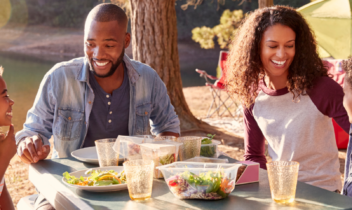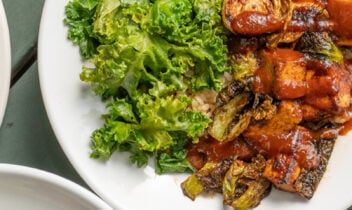TheBUZZ: Certain fruits and vegetables should not be stored together?
WHAT THEY’RE SAYING
When certain fruits and vegetable are stored together, they cause early spoilage.
WHAT WE KNOW
When fruits approach maturity, they release ethylene. Ethylene promotes the ripening of fruit. It can cause premature ripening in some foods, while in others it can actually cause damage. To reduce unnecessary spoilage of your produce, do not store ethylene-producing fruits and vegetables with those that are sensitive to it.
Check out the chart below to see what fruits and vegetables should NOT be stored together …
 |
| Ethylene-Producing Fruits |
 |
Ethylene-Sensitive Vegetables |
 |
Apple
Apricot
Asian pear
Atemoya
Avocado
Banana
Cantaloupe
Cherimoya
Crenshaw melon
Custard apple
Durian
Feijoa
Fig
Guava
Honeydew melon
Jackfruit
Kiwifruit
Mamey sapote
Mango
Mangosteen
Nectarine
Passion fruit
Peach
Pear
Persian melon
Plum
Prune
Quince
Papaya
Plantain
Rambutan
Sapote
Soursop |
 |
Arugula
Asparagus
Beans
Belgian endive
Bok choy
Broccoflower
Broccoli
Brussels sprouts
Cabbage
Cactus leaves
Carrot
Cauliflower
Celery
Chard
Chayote squash
Chicory
Chili pepper
Chinese cabbage
Collards
Cucumber
Eggplant
Endive
Escarole
Green onion
Green tomato
Kailon
Kale
Kiwano
Leek
Lettuce
Longbean
Mint
Mushrooms
Mustard greens
Okra
Parsnips
Potato
Snow pea
Southern peas
Spinach
Summer squash
Sweet pea
Turnip greens
Tomatillo
Watercress
Watermelon |

Information provided by the University of California Agriculture and Natural Resources
OUR ADVICE
If you’re using fresh fruits and vegetables soon after purchase, and storing them properly, you don’t have to be too concerned with ethylene-producing fruits spoiling your fruits and vegetables. Need some ideas? Visit our recipe database for over 1,000 ways to use your fruits and vegetables!
Remember that all forms of fruits and vegetables—fresh, frozen, canned, dried & 100% juice—are nutritious and count towards your daily recommendation. Dried, canned, frozen, and 100% juice forms of fruits and veggies have a longer shelf life than fresh and are a great choice when you can’t use your fresh produce quickly enough!
Need creative ways to eat more fruits and veggies? See Our Quick Guide to Adding More Fruits & Veggies to Your Day
Visit our Fruit & Vegetable Nutrition Database for more information on specific storage recommendations on over 100 fruits and vegetables.
*Kader, A. Postharvest Technology of Horticulture Crops. California Agriculture and Natural Resources (2011), 262
|






